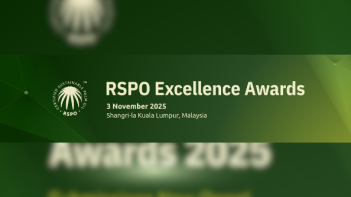By: Fang Lifeng, Head of China, Market Transformation, RSPO
(As first published in China Sustainability Tribune in March 2025)
As global demand for sustainable palm oil surges, China, a pivotal player in the industry, is charting an ambitious path toward greener supply chains, responsible sourcing, and international leadership in sustainable development.
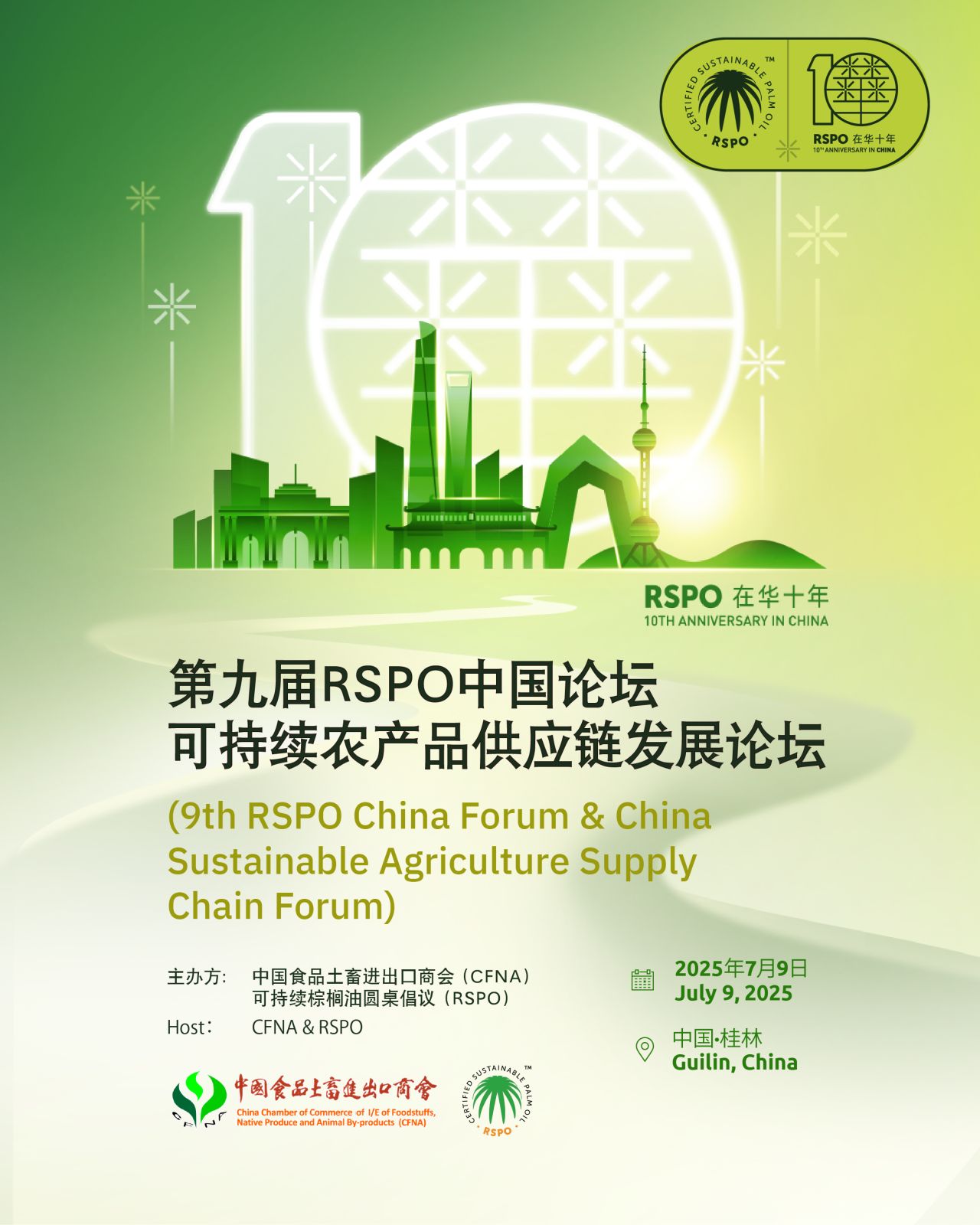
Palm oil, one of the world’s most important plant oils, is favoured for its high yield and wide range of uses, and is widely used in edible oils, food processing, oil chemicals (personal and household care products, etc.) and bio-fuels. However, the environmental and social problems caused by traditional palm oil production methods have become increasingly prominent, including deforestation, loss of biodiversity, and escalating climate change. Against this backdrop, promoting sustainable palm oil production and consumption has become a global focus. 2025 is seen as a crucial year for global environmental governance, with a series of important global environmental and climate agendas emerging intensively, bringing new compliance requirements and market opportunities to the palm oil industry.
Part I: The Importance of Sustainable Palm Oil
Curbing deforestation to slow down climate change
Unsustainable palm oil production methods often come at the cost of deforestation of tropical rainforests, particularly in Southeast Asia. Between 2000 and 2018, nearly 90% of deforestation was associated with agricultural activities, with the expansion of oil palm plantations alone accounting for 7% of global deforestation, according to data from the Food and Agriculture Organization (FAO).
Loss of forests, as a major carbon sink, and the conversion of peatlands to other uses accounted for 11% of global greenhouse gas emissions. Therefore, curbing deforestation and preventing forest degradation are key measures to mitigate climate change.
Sustainable palm oil production has a positive impact on climate change by significantly reducing carbon emissions through preventing deforestation and peatland development, as well as adopting environmentally friendly agricultural practices.
Biodiversity conservation
Biodiversity is essential for providing ecosystem services, ensuring food security and sustainable development. The rainforests in Southeast Asia are some of the most bio-diverse ecosystems on the ground. Deforestation and land use changes resulting from the expansion of unsustainable palm oil plantations pose a serious threat to biodiversity. Palm oil production affects at least 193 threatened species worldwide, including endangered species such as orangutans and Sumatran tigers, according to the International Union for Conservation of Nature (IUCN).
Sustainable palm oil production upholds the protection of forests and natural habitats, managing areas with High Conservation Value (HCV) and High Carbon Storage (HCS) to prevent them from being converted into palm oil plantations, thereby protecting biodiversity.
Supporting multiple United Nations Sustainable Development Goals (SDGs)
Promoting sustainable palm oil development is closely linked to multiple United Nations Sustainable Development Goals (SDGs), including Goal 1 (No Poverty) and Goal 2 (Zero hunger): Increase income for smallholder and improve their livelihoods; Goal 8 (decent work and economic growth): Provide jobs and promote economic development; Goal 12 (Responsible Consumption and Production): Promoting efficient use of resources and sustainable production; Goal 13 (Climate Action): Mitigating climate change by curbing deforestation; Goal 15 (Terrestrial Life): Protecting biodiversity and forests; Goal 17 (Partnerships for Goal Achievement): Unite stakeholders to drive sustainable palm oil development through global partnerships, such as the Roundtable on Sustainable Palm Oil (RSPO).
Part II: Global Progress and Trends in Sustainable Palm oil
Global certification system for sustainable palm oil
There are currently three major sustainable palm oil certification systems worldwide.
1) The RSPO is a global partnership aimed at promoting sustainable development in the palm oil industry. It has developed global sustainable palm oil standards for sustainable palm oil, including the RSPO Principles and Criteria (P&C) Standard, the RSPO Independent Smallholder (ISH) Standard, and the RSPO Supply Chain Certification Standard, dedicated to protecting the environment, improving smallholder livelihoods, and benefiting the wellbeing of communities.
2) The Malaysia Sustainable Palm Oil (MSPO) certification is Malaysia’s national certification system applicable to oil palm plantations, smallholder farmers and processing facilities, aiming to ensure that palm oil production meets sustainable development requirements, covering compliance, transparency, environmental, economic and social aspects.
3) Indonesia Sustainable Palm Oil (ISPO) certification is Indonesia’s national certification system aimed at supporting economic, social and environmental sustainability, covering core principles such as compliance, good agricultural practices, environmental and natural resource management, biodiversity conservation, transparency and social responsibility.
Trends of major producing countries
Indonesia and Malaysia are the world’s largest palm oil producers, accounting for more than 80% of the global output. Malaysia’s MSPO-certified palm oil accounts for 88% of its total production by 2024, and the country’s plans have effectively driven sustainable production and exports. Indonesia, the world’s largest producer of palm oil, has seen its ISPO-certified area reach 25% of its total plantation area by 2022, driven by large plantation companies.
The RSPO Standards are a globally recognised certification system for sustainable palm oil. RSPO Certified sustainable palm oil production area has steadily increased, covering 23 countries in 2023 with a total certified area of 5.2 million hectares. Meanwhile, the global supply of RSPO Certified Sustainable Palm Oil (CSPO) reached a record high of 16.1 million tonnes, accounting for 20.1% percent of the world’s total palm oil production. Indonesia and Malaysia contributed 79.8% of the world’s sustainable palm oil production. In addition, sustainable palm oil production in Latin America and Africa has grown rapidly, reaching 1.84 million and 437,000 tonnes respectively.
China is the world’s second-largest importer and third-largest consumer of palm oil, and its influence in the global palm oil value chain is growing.
Progress in major consuming countries
China, the European Union, India, Indonesia, India, China, the European Union and the United States are the world’s major palm oil consumer markets. According to RSPO statistics, the world’s major palm oil-consuming countries have made significant progress in sustainable palm oil (CSPO). Global consumption of RSPO CSPO rose to 9.8 million tonnes in 2023. Among them, Europe and North America combined consumed 4.7 million tonnes, accounting for 47% of global CSPO consumption, and in their respective markets, CSPO consumption accounted for nearly 90% of total palm oil consumption. It is worth noting that the seven European countries signed the Amsterdam Declaration as early as 2015, committing to 100% sustainable palm oil use by 2020. In addition, the European Union Deforestation Regulation (EUDR), which has been postponed, will come into effect officially by the end of 2025.
By contrast, emerging markets have shown strong growth momentum in sustainable palm oil consumption. Malaysia and Latin America have already accounted for more than 10% of CSPO consumption, and India added 50,000 tonnes of CSPO consumption in 2023. Meanwhile, countries and regions such as Australia, Japan, and South Africa, Japan and Australia also showed a significant growth trend.
Corporate collective action to drive sustainable palm oil supply chains
Voluntary collective action by the private sector, particularly the commitment of multinational companies to sustainable palm oil procurement, has greatly driven the development of the global sustainable palm oil supply chain. Members of the RSPO cover all links of the palm oil supply chain, including multinational companies such as Unilever, Nestle, L’Oreal, and Procter & Gamble, which actively commit to using 100% RSPO Certified palm oil in their products and work with supply chain partners to ensure that the palm oil they purchase comes from sustainable sources. In addition, some companies use technologies such as satellite monitoring and block-chain to track and verify the source of the palm oil they purchase, increase transparency and reduce the risk of illegal logging.
Part III: Progress and Trends of Sustainable Palm Oil in China
China is the world’s second-largest importer and third-largest consumer of palm oil, and its influence in the global palm oil value chain is growing. The Chinese market plays an important role in the production and development of sustainable palm oil in Indonesia and Malaysia as well as globally.
China’s total imports of palm oil (and products) in 2024 were 4.36 million tonnes, mainly from Indonesia and Malaysia, according to customs data. Palm oil is mainly used in the edible oil, food processing and oil chemical industries in China. By the end of 2024, RSPO China had 445 members, including companies such as COFCO, Yihai Kerry, Yili, Mengniu, Shanghai Jahwa, Perfect Diary and Yum China, covering all links of the value chain from trade processing, consumer goods brands to retailers. The annual consumption of certified sSustainable palm oil (CSPO) in the Chinese market in 2023 was close to 500,000 tonnes, accounting for 8.7% percent of total palm oil consumption that year, according to the RSPO Impact Report 2024.
With the support of platforms and documents such as the RSPO China Forum, the China Sustainable Palm Oil Initiative (CSPOA), and the Sustainable Palm Oil Procurement and Consumption Industry Guide, the industry and stakeholders’ awareness of sustainable palm oil and related capabilities have continued to rise. Leading listed companies and brands have become an important part of the RSPO Membership and have begun to take action, including setting time-bound zero deforestation policies and targets, building supplier capacity, increasing transparency, and launching ambitious sustainable palm oil sourcing programs.
For instance, in November 2024, the first batch of 750 tonnes of RSPO Certified Identity Preserved (IP) grade sustainable palm oil arrived in the Port of Shanghai, accomplished through a collaboration between Yili Group and Yihai Kerry Group.
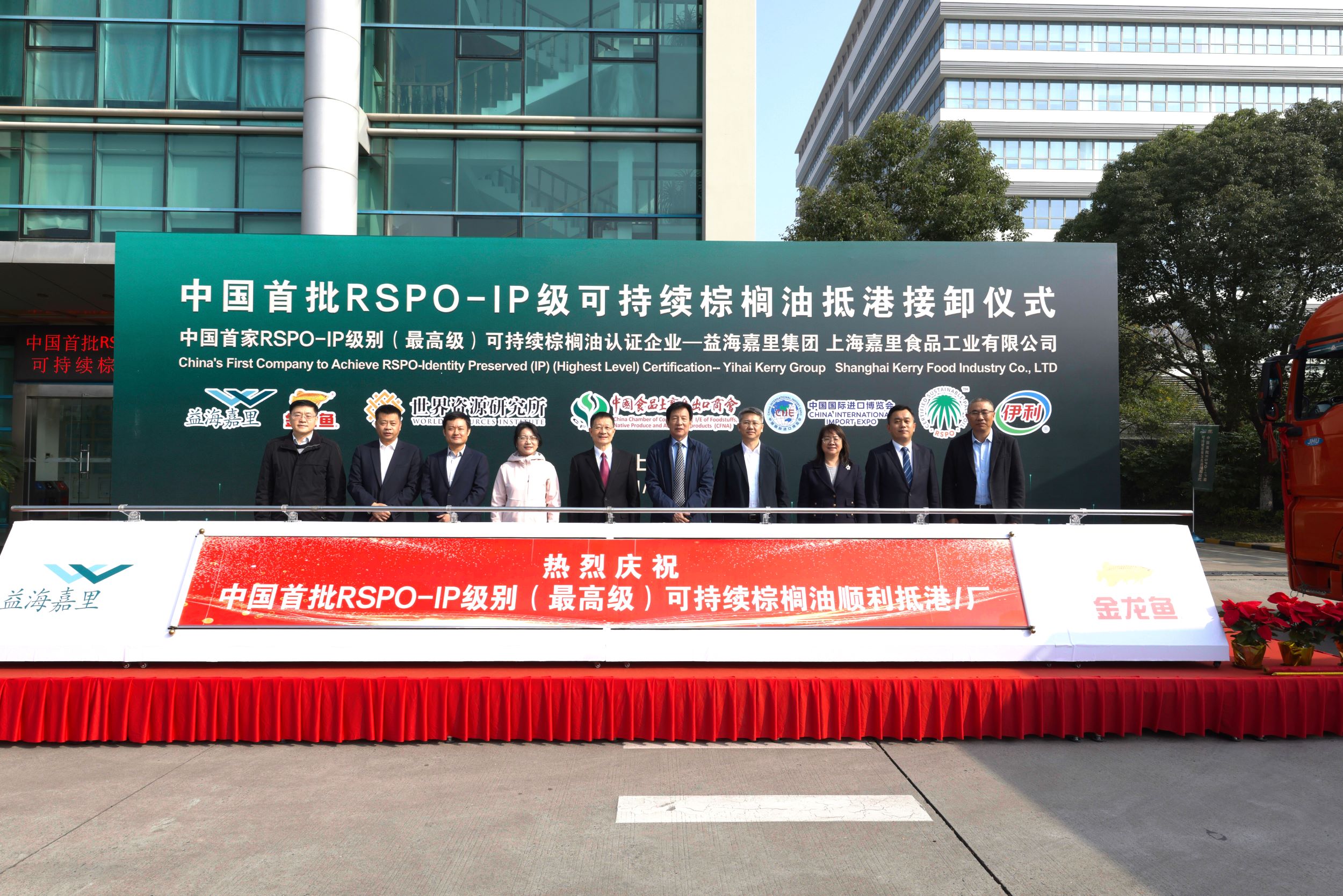
Overall, it can be seen that multiple factors are actively driving the pace of sustainable palm oil development in China.
Policy and global governance framework impact: In recent years, China’s active participation in global environmental governance and its commitment to addressing hot issues such as climate change, biodiversity loss and deforestation have shown positive policy signals. In 2021, China signed the Glasgow Leaders’ Declaration on Forests and Land Use, committing to curbing and reversing the trend of forest loss and land degradation by 2030. In addition, Chinese government departments and multiple organisations have carried out a number of policy studies on global green value chains and developed plans such as the strategic framework for green value chains of commodities. In the future, China will continue to improve its top-level design to provide a clear direction for green procurement of bulk agricultural products.
Multinational brands and customer demand: Customers and multinational brands from the European and American markets have played a significant role in promoting the purchase and use of sustainable palm oil in the Chinese market, driving manufacturers, traders and distributors to participate in the global supply chain of sustainable palm oil, obtaining RSPO certification and increasing the share of sustainable palm oil in the Chinese market. At the same time, this has also driven the strengthening of China’s green supply chain management practices for long-term business success.
Corporate ESG strategy: Commitment to long-term sustainability and ESG performance, as well as demonstration of sustainable leadership, has become an intrinsic driving force for leading Chinese companies and brands to engage in sustainable palm oil procurement and application. At the same time, conducting due diligence and corporate disclosure can not only meet the needs of regulators, investors and other stakeholders, but also help the palm oil industry eliminate deforestation and social risks in its supply chain.
In China, a year of planning for the 15th Five-Year Plan and the backdrop of a comprehensive green transition, sustainable supply chains for commodities such as palm oil are expected to receive more policy support.
Part IV: Outlook
To address the severe challenge of climate change, by 2025, countries will urge global enterprises to strengthen environmental management and further deepen sustainable business practices through more ambitious commitments and goals, as well as increasingly stringent due diligence and compliance requirements. Under the requirements of the Paris Agreement, contracting states need to update and submit new nationally determined contributions (NDCs). Meanwhile, the 30th Conference of the Parties to the United Nations Climate Change Convention (COP30), which will be held in the Brazilian Amazon region in November 2025, is expected to further promote coordinated governance in response to climate change, biodiversity conservation and forest protection.
At the corporate level, there will be a larger wave of environmental due diligence in the global supply chain, making sustainability compliance of products and enterprises a key competitive edge. The EU’s Corporate Sustainability Reporting Directive (CSRD) enters its implementation phase in 2025, requiring companies to start disclosing their environmental impacts, including greenhouse gas emissions and biodiversity impacts. In addition, the European Union Deforestation Regulation (EUDR), which has been postponed for a year, will come into effect on 30 December 2025, stipulating that businesses engaged in activities related to seven categories of agricultural products, including palm oil, which are placed on the EU market or exported from the EU, must prove that these products have not been involved in deforestation activities since 31 December 2020.
In China, a year of planning for the 15th Five-Year Plan and the backdrop of a comprehensive green transition, sustainable supply chains for commodities such as palm oil are expected to receive more policy support.
In 2024, the Opinions on Accelerating the Comprehensive Green Transformation of Economic and Social Development issued by the Central Committee of the Communist Party of China and the State Council proposed that by 2030, positive progress should be made in green transformation in key areas, green production and lifestyle should be basically formed, the policy and standard system supporting green development should be more complete, and significant achievements should be made in the comprehensive green transformation of economic and social development. In addition, eight departments including the National Development and Reform Commission jointly issued the Green Technology Promotion Catalogue (2024 Edition), aiming to accelerate the promotion and application of advanced green technologies and promote green and low-carbon development of the economy and society.
For enterprises, increasingly strict compliance requirements and market expectations are not only challenges but also opportunities and new growth points. By enhancing ESG management and performance, companies can achieve long-term business success while meeting regulatory requirements. In particular, for Chinese companies in the palm oil supply chain, in the face of increasing requirements for due diligence, transparency and sustainability, they should seize the opportunity to deepen engagement and accelerate supply chain upgrading, gain more orders and cooperation opportunities in future international competition, and play an important role in supporting responsible and fair palm oil supply chains.
More importantly, under the guidance of the green development concept, Chinese enterprises and brands can take on global responsibilities and play leadership roles. China’s trade and investment activities in palm oil-producing countries are increasing, and under the Belt and Road Initiative, it may also invest in building new plantations, processing plants and trade routes in Southeast Asia, Africa and Latin America.
If sustainable development concepts and international best practices can be integrated into these projects first, it will not only better prevent environmental and social risks, but also establish an international image of responsible investment and trade and contribute more Chinese solutions to the development and governance of sustainable palm oil worldwide.
Source: China Sustainability Tribune, March 2025
Keep reading
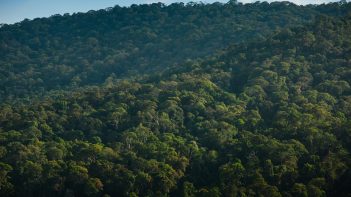
Translations of the 2024 RSPO Standards Now Available
RSPO accepted in the Netherlands as a private control system for EUDR
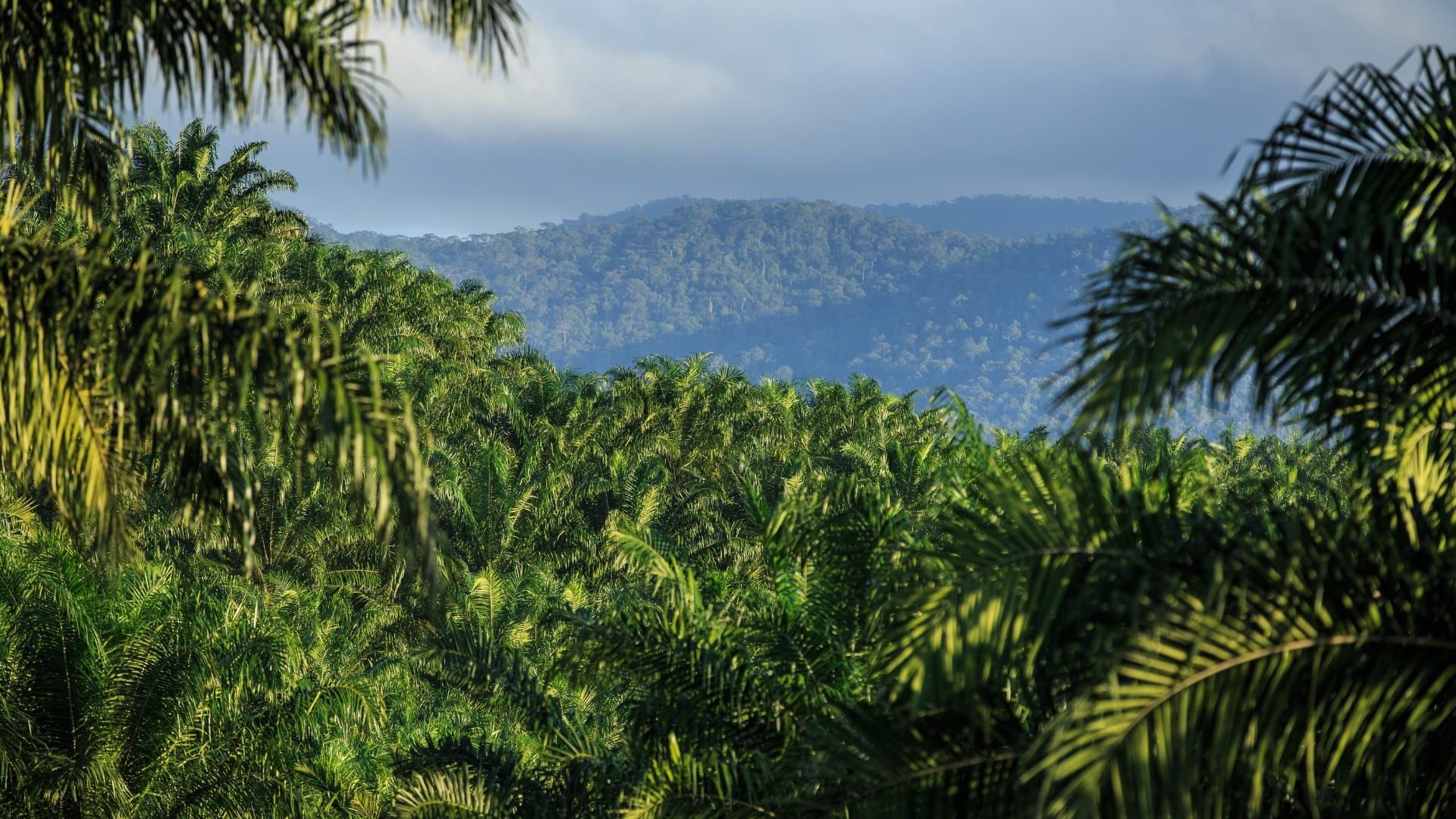
RSPO x JaSPON Conference and Member Engagement Forum 2025 Spotlights Japan’s Sustainability Success and Market Growth
Call for Expression of Interest: Independent Investigation of a Complaint
Call for Expression of Interest: Mexico National Interpretation Task Force for 2024 RSPO Principles and Criteria (RSPO P&C) and Independent Smallholder (ISH) Standard
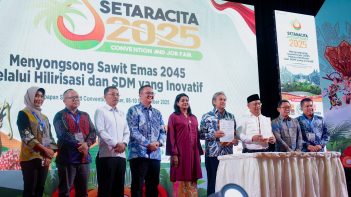
RSPO–APKASINDO Partnership to Boost Inclusive Growth, Certification, and Market Access for Oil Palm Smallholders

Open Letter to COP30 President: Integrating Forests and Biodiversity: A Policy Central to Paris Agreement Success

Bridging the Auditing Divide: Key Takeaways from the RSPO Assurance Forum 11
